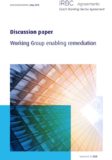Parties within the Dutch Banking Sector Agreement publish a paper on enabling remediation. The paper explores the role and responsibility of banks with regard to remedy, when connected to human rights impacts through client relationships. It summarizes the most important points of conversation, consensus and broadly shared insights and diverging perspectives where parties were unable to reach consensus. The paper provides a menu of options for action that banks could take to enable remediation, without being prescriptive.
Enabling remediation
An important pillar of the UNGPs is remedy. When human rights abuses occur, those who are harmed are entitled to effective remedy. The idea of effective remedy is that those individuals or groups who have suffered adverse impact to their human rights should be made whole again, by restoring them to a situation the same as or as close as possible to the position they were in before the impact occurred. In this report, two questions have been explored on the subject:
- How to understand the responsibility of a bank when connected to an impact through the activities of a client the bank provides financial services or products to, in terms of when the bank might have contributed to a harm, and when the bank would be directly linked to that harm.
- The practical roles banks could play and actions a bank could take to enable remedy in practice, across all forms of responsibility.
Via a case-based approach, specific cases were explored and measures in the field of due diligence and practical steps banks could take to enable remediation were discussed. Through its discussions the working group has recognized that remedy is a relevant consideration in all cases in which a bank is connected to a negative impact, across all forms of responsibility. The paper recognizes significant opportunities for banks to strengthen the focus on remedy in practice, whether in contribution or linkage situations, and thus contribute to better outcomes for people.
Working group
The multi-stakeholder working group on enabling remediation consisted of parties to the agreement, a number of the adhering Dutch banks and several experts on the matter (see annex to the paper). The Dutch Banking Association (NVB) had a facilitating role for the representatives of the participating banks in this working group.
Contributing to the international debate
The parties will provide the outcomes of the working group as input for the discussions in the OECD Advisory Group on Responsible Business Conduct in the financial sector in order to create a level playing field within the financial sector (DBA para. 7.5). The paper hopefully provides insights and learnings that would be relevant not only for Dutch banks, but for the broader global community.
Lene Wendland, Chief, Human Rights and Economic and Social Issues Section, OHCHR: “At a time of increased international attention to the human rights responsibilities of financial institutions, the discussion paper is unique: it brings together the expectations of banks and stakeholders on the banks’ role and responsibility with regard to remedy and generates learning that others can benefit from. These multistakeholder conversations are needed to bring more clarity to the banks’ responsibility to respect human rights.”




